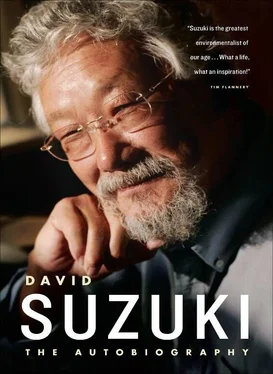My father and mother were born in Vancouver in 1909 and 1910, respectively, and survived the trauma of the Great Depression thanks to hard work and a strong extended family, which was held together by economic necessity and the forces of racism in British Columbia at that time. Asians, Canadian-born or not, differed from other Canadians in language, physical appearance, and behavior. My parents went to schools with other Canadians, and though Japanese was the first language each acquired at home, they soon were fluently bilingual and had many non-Japanese friends. Education was a very high priority for their parents, and Mom and Dad both completed high school, which was considered a good education in the 1920s. They stoically accepted encounters with bigots at school, in stores, and on the street, whereas only the most rebellious among Japanese Canadians of that time would ever have thought of dating, let alone marrying, a white person. Every one of the nine siblings of my parents' families married Japanese (today, among dozens of their children and grandchildren, only my twin sister, Marcia, is married to a Japanese). Even though their social lives revolved around family and other Japanese, however, my parents felt themselves fully Canadian.
Hard work was a constant part of their lives from childhood on. At about ten years of age, my father was sent to live with a wealthy white family as a “houseboy,” performing small chores for the household and receiving room and board in return. Perhaps the most important effect of that period in his life was that in his time off he read the entire set of the encyclopedia The Book of Knowledge , and he retained much of that information. As a girl, Mom went out picking berries, something at which she became very adept. After the war, when we lived in southern Ontario, she, my sisters, and I worked on farms, picking strawberries and raspberries on piecework (that is, we were paid a set amount for each box we picked), but it was impossible to keep up with Mom.
Dad and Mom met while they were both working with Furuya's, a Vancouver company that until recently still existed in Toronto; it specialized in imported Japanese food and cooking paraphernalia. The company had a rigid rule of nonfraternization between the sexes, but Mom and Dad began to date on the sly. Eventually, Dad had to quit Furuya's to date Mom more openly. His Japanese had deteriorated when he went to school, and when he approached Mom's father to ask permission to take her out, he must have phrased it in such a way that it sounded as if he were proposing marriage. “You're both far too young,” my grandfather replied in Japanese. “If you're serious, then wait, and come back in five years.”
Well, they continued to see each other, and five years later, in the mid-1930s, Dad asked for permission to marry Mom and got it. Theirs was not a traditional arranged marriage; instead, they were imbued with the Western notion of romantic love. We kids took it for granted that they smooched, and on occasion we could overhear their active sex life.
After they were married, they received financial help from Dad's parents to start a small laundry and dry-cleaning shop in Marpole, a Vancouver neighborhood near the edge of the city and alongside the Fraser River. We lived in the back of the shop. Mom had a miscarriage early in their marriage, and then Marcia and I arrived in the world on March 24, 1936. Dad says Mom became enormous, and the delivery was long and harrowing. I was born first, weighing in at nine pounds, but Marcia took a lot longer — so long, in fact, that Mom had no strength left and finally the doctor reached in with forceps and dragged Marcia out. As the second-born of twins, she is considered in Japanese tradition to be the elder, who allows the younger one of the pair to exit first. But she was tiny, weighing less than three pounds, and the forceps delivery caused some damage that resulted in a weakened right side.
I was taken home when Mom left the hospital, but Marcia stayed behind. Visiting her daily, Dad was upset that she seemed to be left without any care, whereas I was at home and the center of attention. He told the doctor that if Marcia was going to be left to die, he would prefer to take her home where she could be loved and cared for. The doctor assented, and so this young couple took over responsibility for both babies, one requiring a lot of care and attention. And Marcia pulled through. As she grew up, I always felt Mom and Dad were too hard on her, treating her no differently from me and later our two sisters and demanding that she work alongside us. I learned later from my father that Mom was determined Marcia would grow up to be tough and able to take care of herself. She did; she became a terrific softball pitcher and is competitive in anything she does. She had two children and is a wonderful grandma to her two grandsons.

Mom (Setsu Nakamura) and Dad (Carr Suzuki) on their wedding day, March 21, 1934

Dad and the twins, Marcia (left) and me, in 1936
Aiko arrived a year and a half later. Dad had hoped for another boy and had chosen the name Gerald, so when she was born, she was called Geraldine, or Gerry for short. We all had Japanese middle names, and in later life when she had assumed a more bohemian, artistic life, Gerry dropped her first name for Aiko, her second.
Sibling to twins, Aiko behaved like the stereotypical second child: a trickster, full of mischief, always wanting to explore. Dad had a classic Japanese attitude toward girls: they should finish high school, get a job, and find a husband. We later moved to London, Ontario, and both Marcia and Aiko took off for Toronto as soon as they finished high school so that they could become independent. Soon Aiko was immersed in an artistic crowd. I remember going home to London while I was in college in the United States and meeting her boyfriend, Alex, a big Hungarian with a beard and ponytail. This was the mid-1950s, and a beard was shocking enough, but to us a ponytail on a man was unheard of. To top off the shame, Alex and Aiko were living together in an age when many men still hoped to marry a virgin. Aiko always pushed the edges, and I, Mister Square in a brush cut, was pulled into her exciting, scary world. I was with her when she died on December 31, 2005.
During the war, when we were living in internment camps in the interior of British Columbia, Dad had been separated from the family for a year as he lived in a road camp building the Trans-Canada Highway. He did manage to make his way to Slocan City, where we were imprisoned, for a couple of days before going back to the road camp. Nine months later, our youngest sibling, Dawn, was born. Dawn became Dad's surrogate second son and accompanied him on numerous fishing trips. She did not want to follow her older sisters by going straight to work after high school, and when she said she wanted to go to university, Aiko and I lobbied very hard to support her until Dad relented. She was also a wonderful ballet dancer and, after completing her degree at the University of Toronto, obtained a Canada Council grant to dance with Martha Graham in New York City, a position she held for years.
AS A BOY, I would stand for hours behind a steam-operated machine that Dad used to press shirts and pants, asking him a steady stream of questions as he worked. He was able to answer me with what he remembered from The Book of Knowledge . He would take me along when he delivered clothing to customers, and I would patiently wait for him in the car. He was a garrulous man, and toward the end of the deliveries his visits with customers got longer, probably because he was having a social drink or two while talking. Dad was a great friend, and I hope he found my companionship as much of a delight as his was for me.
Читать дальше




![David Jagusson - Devot & Anal [Hardcore BDSM]](/books/485905/david-jagusson-devot-anal-hardcore-bdsm-thumb.webp)









